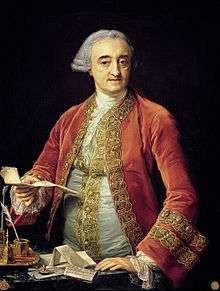Manuel de Roda

Manuel de Roda y Arrieta, (1706 in Zaragoza – 30 August 1782), was Ambassador in Rome under King Ferdinand VI of Spain and then nominated by King Charles III of Spain, half-brother of Ferdinand VI and formerly King of Naples and Sicily till the death of his half-brother Ferdinand, Ministry of "Grace and Justice", which he held for 17 years.
Biography
He participated actively in the creation of the Royal Spanish Academy of History (1735–1738).
As a Jansenist and adviser to Charles III during the reformist era that produced the Esquilache Riots attributed to Jesuit agitation, Roda was instrumental in the expulsion of the Jesuits in 1767 from Spain and Spanish overseas possessions in Europe, America and the Philippine Islands.[1] The Portuguese expelled the Jesuits all their domains earlier (circa 1759), under Sebastião José de Carvalho e Melo, 1st Count of Oeiras, 1st Marquis of Pombal, followed by Spanish, French and many Italian territories during the period 1767-1769. This religious Roman Catholic Order, would be hounded under European pressures around the aging Pope Clement XIII.
The Society of Jesus as Institution would be banned on July 21, 1773 by the Pope Clement XIV.
The banning brief "Dominus ac Redemptor" appeared at that date, being suppressed thus the Society of Jesus, by Pope Clement XIV. Russia, Prussia and Poland (then absorbed by Russia) denying papal catholic authority (and Bourbon's influence) in their kingdom forbade the promulgation of the brief and ordered the Jesuits to carry on their educational activities wherever they were.[2]
Roda death at the Royal Site of San Ildefonso, Segovia. There, he was buried at the "Christ Chapel" of this Summer Royal Palace deciding the King to pass his title of Marquis of Roda to Miguel Joaquín Lorieri, married to his niece Francisca de Alpuente y Roda.
Footnotes
- ↑ D.A. Brading, The First America: The Spanish Monarchy, Creole Patriots, and the Liberal State. Cambridge: Cambridge University Press 1991, pp. 499-500.
- ↑ Choiseul, the architect of the suppression in France received a letter form Manuel de Roda, his counterpart in Spain: "We have killed the Son. Now nothing remains for us to do except carry out a like action against the mother, our Holy Roman Church" (in W.O'Malley, the Fifth week, Chicago, 1976, p.60)
Some bibliography and internet links
- RAFAEL OLAECHEA, "Las relaciones hispano-romanas en la segunda mitad del XVIII",(in Spanish), Institución Fernando el Católico, Zaragoza, (1999), ISBN 84-7820-534-9
- ISIDORO PINEDO IPARRAGUIRRE, "Manuel de Roda y Arrieta, ministro de Carlos III", in Letras de Deusto, ISSN 0210-3516, Vol. 12, Nº 23, (1982), pags. 97-110.
- JESUS PRADELLS NADAL, "Política, libros y polémicas culturales en la correspondencia extraoficial de Ignacio de Heredia (y Alamán) con Manuel de Roda (1773-1781)", Revista de historia moderna, N. 18 (1999–2000). ISSN 0212-5862, pp. 125–222
- Refined extract by A.E. on this net link: Correspondence with Minister of Justice de Roda from Ignacio de Heredia (Spanish Embassy in Paris, as Secretary of the Embassador Count of Aranda, Pedro Pablo Abarca de Bolea y Jiménez de Urrea, 10th Count of Aranda, 1718-1798), dealing with Spanish Literature, the lawsuits against Pablo de Olavide y Jáuregui (1725-1803), the comments on the Spanish defeat of 1775 trying to conquer the African city of Alger, and the purchasing orders for Paris Librarians to enhance the magnificent library of de Roda, today conserved and visited by prestigious hispanists in the Real Seminario de San Carlos de Zaragoza.